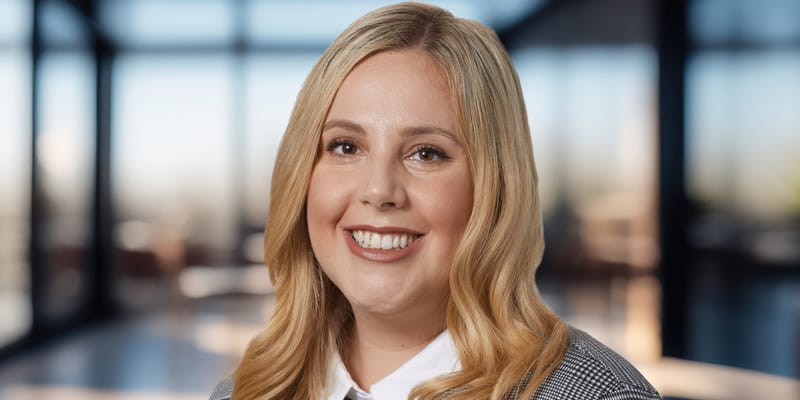Reed Smith graduate recruitment manager Rebecca Schrod on being methodical, proactive and self-reflective

With vacation scheme and training contract applications getting increasingly competitive, the whole process can sometimes feel enigmatic, and you might find yourself questioning what you could have done better at each stage.
Rebecca Schrod, graduate recruitment manager at Reed Smith, sat down with Legal Cheek Careers to talk through what the firm is looking for in written applications, video interviews, assessment centres and finally, the vacation scheme — valuable tips that could bring you a step closer to getting that elusive TC.
The first hurdle for applicants to get over is the written application – what are you looking for to progress an application to the next stage?
We put the biggest emphasis on your answers to our research questions in deciding whether to progress a candidate’s application. These are our opportunity to really get to know candidates, so make sure you really get across your interests and motivations. We also want to see evidence that you have done your research into the firm – so make sure that you are highlighting knowledge that is more in-depth than something you could get from the first page of our website! Your knowledge doesn’t have to be exhaustive but spending 30 minutes reading a few articles or listening to a podcast on a topic that interests you really can make a big difference.
Finally, don’t neglect the basics. Check your spelling and grammar and make sure your answers are well structured. Attention to detail and good written communication skills are key for trainees so it’s really important to proof read your applications.
In a written application, what are some things that candidates can mention which demonstrate to you that their interest in the firm is genuine?
We’ve picked questions that really allow candidates to showcase their knowledge of and interest in the firm. You can demonstrate interest in the firm in lots of ways, but I am always impressed when candidates are able to mention their experiences at events, and to tie this in with something that particularly interests or motivates them.
Attending events, like our upcoming ‘Life as an Entertainment & Media Lawyer’ one can really demonstrate that you are genuinely interested in the firm and have spent time researching us. However, I know that not everyone can spend time attending events and have also seen interest demonstrated through examples of particular Practice Areas, deals, clients or articles that really interest you. It’s also really impressive when you are able to link some of this knowledge back to your own interests – for example, we have a strong Pro Bono practice, so some candidates will talk about their own experiences doing Pro Bono at university.
The video interview can sometimes be quite nerve-wracking and awkward given that you’re not directly speaking to a person. What advice do you have for those wondering how to prepare for it and the extent of preparation (writing paragraphs vs bullet points, for instance)?
It sounds a little bit awkward, but videoing yourself practicing answers to common questions can really help make you feel a bit more comfortable during video interviews. In terms of preparation, because a lot of our questions are skills-based, I recommend really considering what you are good at. Are you a great communicator? Do you work well as part of a team? Are you very organised? Once you’ve done this, think of some examples of times you have shown this skill, and incorporate this into your answers if a relevant question comes up. Finally, I think it’s important to not come across as too ‘rehearsed’, so I think most applicants will answer questions better if they use bullet points to prepare rather than writing out a full answer.
What skills have you seen a trainee or applicant exhibit in the past that have stood out to you the most?
I think one of the most important trainee skills is being proactive. It really stands out when trainees or Vacation Scheme participants don’t just wait to be given work, but ask around their department and really get involved.
You worked at ULaw prior to joining Reed Smith, so you have an insight into both the student and firm perspectives of applications. What are some commercial awareness pitfalls you’ve come across that you’d advice applicants to steer clear of?
In terms of answering commercial awareness questions, I really recommend trying to identify a more niche or Industry group focused commercial issue. This demonstrates a more in-depth knowledge and shows you have really considered how the issue is relevant to the firm you’re applying to. This doesn’t have to take hours of research – the industry group pages on our website have a variety of articles and podcasts that can be useful to help you write answers to commercial awareness questions and build your knowledge more generally.
Over half of the answers we’ve received so far cover broad issues like AI and Legal Technology, the war in Ukraine, Brexit, Covid-19 and climate change. Whilst it is absolutely possible to write a successful answer on one of these broad topics, a less general one can make you stand out.
What makes an applicant who successfully tackles the case study at the assessment centre different from one who is unsuccessful at this stage?
There isn’t any one thing, however, to be successful, it can help applicants to have a really clear idea of what is being assessed. The main things we are looking for during this assessment include logical thinking and analytical skills, so try to calmly and methodically make your way through the documents, highlighting or noting what you think are the most important things as you go. We are also looking for strong time management skills, so try to keep track of time during your prep time. We are also looking for good communication skills — so candidates who are able to clearly answer our questions in a concise manner will also stand out.
When it comes to the vacation scheme, how should students strike the balance between getting to know people at the firm and spending time on live matters in their team – essentially, how can they get the most out of their time on the scheme?
It is really difficult to balance this, but candidates should make sure that the majority of their time is spent in their seat, doing practical work. If your supervisor doesn’t have too much work for you on a particular day, remember the point about being proactive above and introduce yourself to other members of the department and ask them for work. About a quarter of your time can then be spent on workshops, events and networking sessions organised by the Graduate Recruitment team as well as coffees and meetings with staff across the firm. This is of course a great way to get a sense of the culture of the firm and whether you can picture yourself there. It is a tough balance, but don’t neglect your work for too many networking opportunities as we can’t offer candidates a training contract if we aren’t able to assess the quality of their practical work.
So, a candidate’s gone through all the hoops and they’re at the final interview – what are you looking for from them at this stage to give them a training contract offer?
Whilst we do hold an end of Vacation Scheme interview, we take a holistic view of how a candidate has performed throughout the scheme when deciding whether to offer them a Training Contract. Our final interview is reflective, so we want to see evidence that candidates have really thought about their experiences including what they enjoyed and if there is anything they would do differently. Finally, we’re looking for energy and enthusiasm.
Meet Rebecca Schrod at ‘Life as an entertainment and media lawyer — with Reed Smith’, a virtual student event taking place TOMORROW. Apply now to attend.
About Legal Cheek Careers posts.


